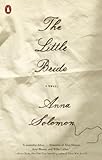What do a ruthless California ad exec and a Jewish mail order bride have in common? Almost nothing. The two best books I read in 2011 — both debut novels published this year — couldn’t be more different, except for the stunningly good writing inside them.
Charles McLeod’s satirical novel American Weather is so raucous, so original, and so stridently anti-consumerism, that it hasn’t yet found a U.S. publisher. The ironies are many. This aptly titled novel captures our country’s zeitgeist with such precision that it could and should be the handbook for Occupy Wall Street. Luckily Random House UK was smart enough to snatch it up. The novel follows Jim Haskin, a middle-aged millionaire who stages the publicity stunt to end publicity stunts: he sells ad space to American corporations on the body of a death-row inmate, who has the companies’ logos tattooed on every inch of his skin. The kicker: the prisoner’s death is broadcast on national television.
What makes this outrageous story readable is the scorching humor McLeod brings to it. He’s laughing at us, with us, all over us. What’s more surprising, though, is the depth of feeling in the book — a mesmerizing kind of melancholy. Haskin may be a first-class despot, but he has a wife in a coma and a teenage son slipping away from him. In letters sent to his father from boarding school, his son is everything Haskin isn’t: sensitive, likeable, profoundly wise. I read this book in airports and on airplanes, and as I splattered the pages with laughter-spit and tears, I felt the uncrossable space between father and son and between the American dream and what we’ve got instead.
This is the time to be grateful for a certain multinational online bookstore — oh, the ironies — pretty much the only place Americans can find this book (through the UK web address, that is). (And yes, an e-book is available!)
 Anna Solomon’s historical novel The Little Bride is equally unflinching, but the world it brings to life is one unfamiliar to most of us. Inspired by the real-life movement Am Olam, which sent Jewish immigrants to the frontier to forge communities in the wilderness, the novel is about Minna Losk, a 16-year-old orphan from Odessa who travels to South Dakota in the 1880s to marry a man she’s never met. To her dismay, he turns out to be a 40-year-old Orthodox widower named Max, who is as poor a farmer as he is a husband. Compounding Minna’s utter lack of feeling for Max are her growing feelings for his 18-year-old son, with whom she develops a super-sexy, passive-aggressive pseudo-romance that alone makes the book worth reading.
Anna Solomon’s historical novel The Little Bride is equally unflinching, but the world it brings to life is one unfamiliar to most of us. Inspired by the real-life movement Am Olam, which sent Jewish immigrants to the frontier to forge communities in the wilderness, the novel is about Minna Losk, a 16-year-old orphan from Odessa who travels to South Dakota in the 1880s to marry a man she’s never met. To her dismay, he turns out to be a 40-year-old Orthodox widower named Max, who is as poor a farmer as he is a husband. Compounding Minna’s utter lack of feeling for Max are her growing feelings for his 18-year-old son, with whom she develops a super-sexy, passive-aggressive pseudo-romance that alone makes the book worth reading.
What stays with me long after finishing The Little Bride, though, are the artful, utterly convincing details of life on the Plains — the paper Minna helplessly pastes to the mud walls of her new house, a rope tied to the family cow to find her way through a snowstorm. This new life is unimaginably austere, and the combination of disappointment and determination with which Minna faces it makes her one of the most memorable protagonists I’ve come across.
Both of these books are about pretty bleak landscapes, yet sentence by sentence, both writers manage to make them feel full and warm and bright. McLeod’s prose is breathless and buoyant, Solomon’s sharp and sleek. Both make me want to sit down at the keyboard and make sentences of my own.
More from A Year in Reading 2011
Don’t miss: A Year in Reading 2010, 2009, 2008, 2007, 2006, 2005
The good stuff: The Millions’ Notable articles
The motherlode: The Millions’ Books and Reviews
Like what you see? Learn about 5 insanely easy ways to Support The Millions, The Millions on Twitter, Facebook, Tumblr.









